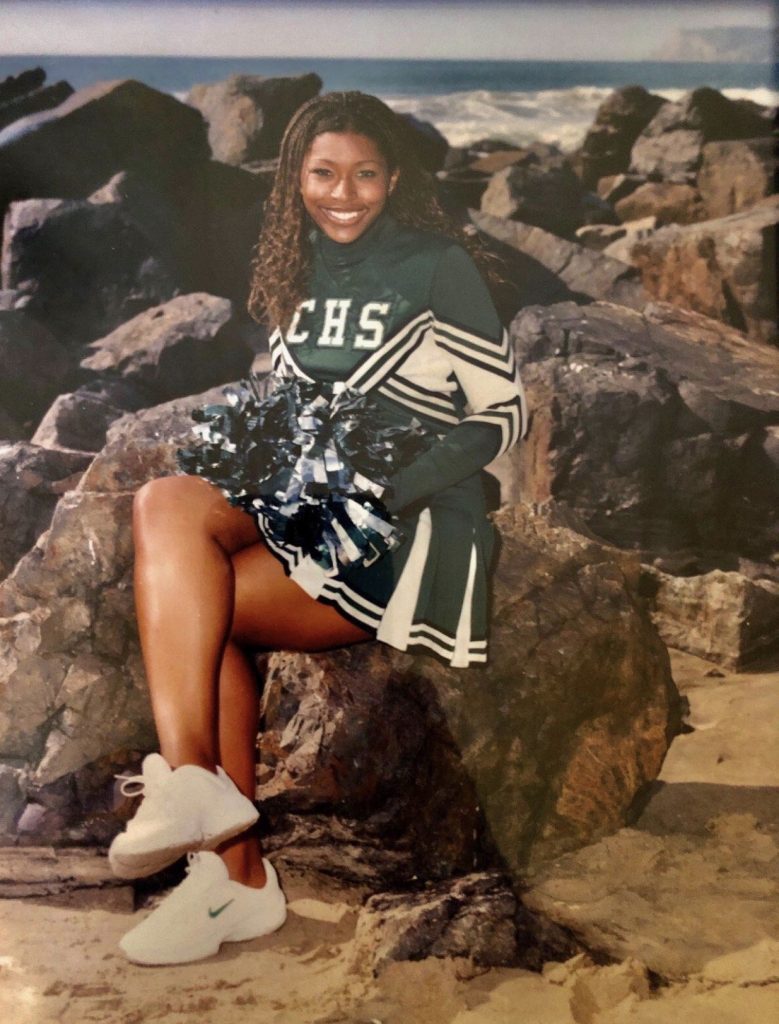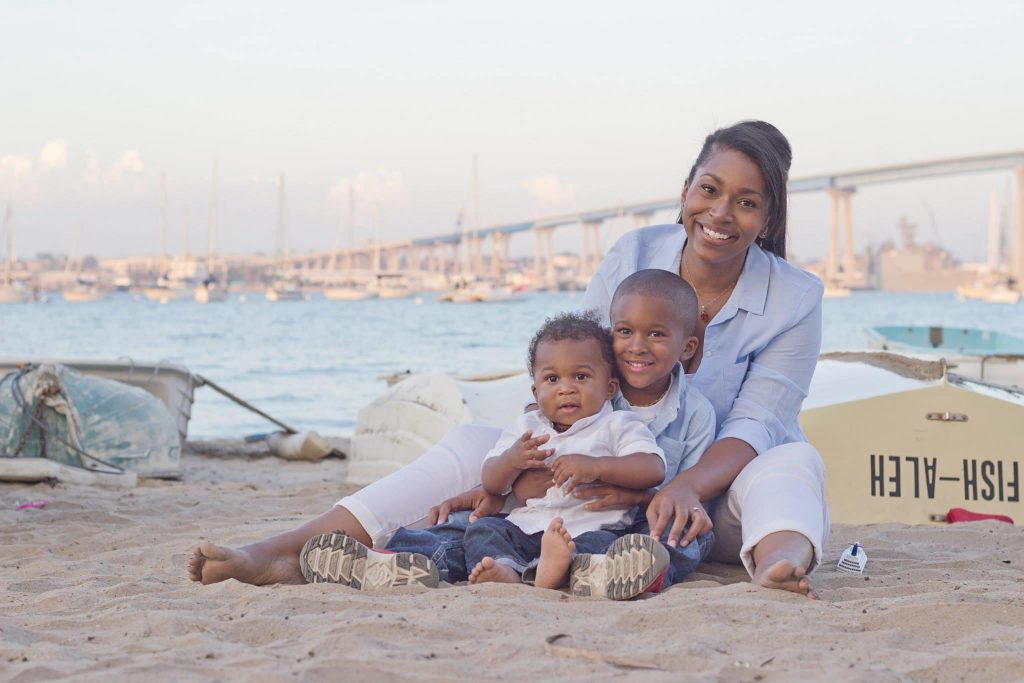According to recent statistics, Coronado is 75% white. So, what’s it like to grow up on the island as a Black American? Just ask Alexis Love, a graduate of Coronado High School, class of 2007.
“It feels like you’re a raisin in the milk, honestly,” says Alexis, who now resides in Illinois with her husband, a Marine, and their four children. “You stick out like a sore thumb, and sometimes it’s quite intimidating.”
Alexis’s father, who retired in 2014 as a Lieutenant Commander in the Navy, was stationed at North Island for most of his 30-year military career. Alexis attended Strand Elementary, Coronado Middle School and Coronado High. Her family left the island in 2008 when her father had a tour in Iraq during the War on Terrorism.
Alexis describes her experience on the island as “pleasant overall,” and says that she always had plenty of people to hang out with. She was a cheerleader, and she recalls happy visits to Stretches Café and Alexander’s Pizza.
Although she wasn’t lonely, her friendships came at a price. When racism reared its ugly head, Alexis had to keep her mouth shut.
“Within my circle, I had the opportunity to speak out against a racist remark,” says Alexis. “But I didn’t. I allowed the fear of being ostracized by my peers to further allow racist remarks and behaviors.”
Alexis says she made herself likable enough to be tolerated by her peers and her community, but in the process, she lost her identity.
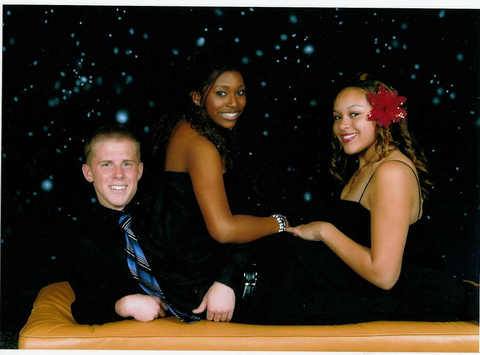
“I knew that the color of my skin made me intimidating, so not too many people were willing to find out if I was a threat or not,” she says. “So, I spent the majority of my life catering to the feelings and wants of those around me.”
Alexis describes the feeling as “taxing.”
“In the process, I lost myself and confidence in being a Black American,” says Alexis. “Being in an environment like that, for that long…it can make you not even like you.”
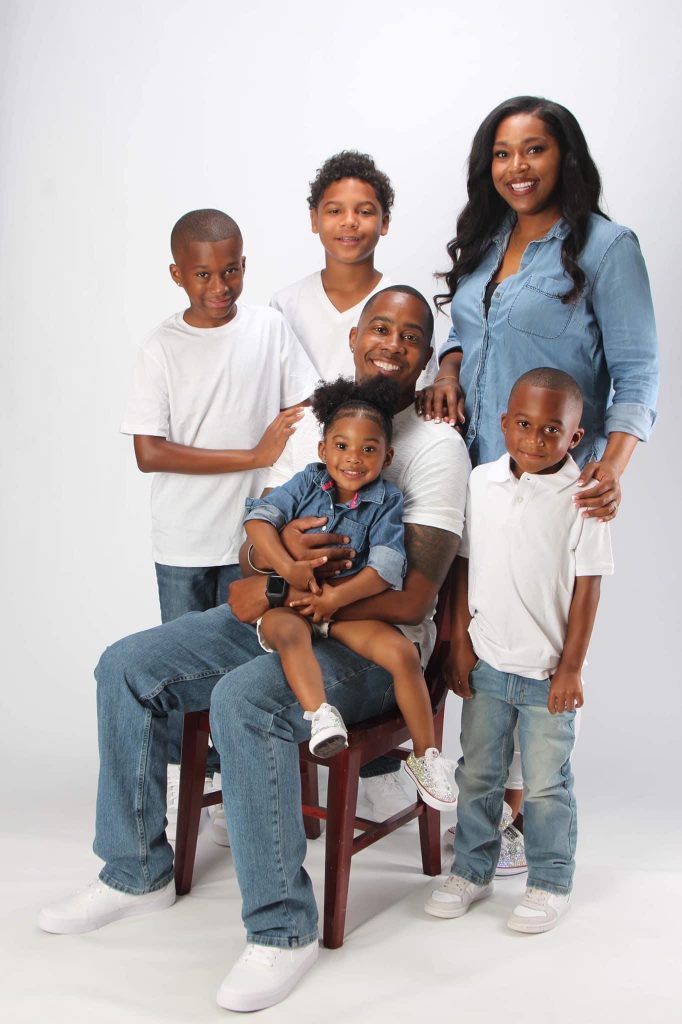
Much of the racism Alexis encountered in Coronado was subtle. But it was part of her daily experience.
“On the surface, Coronado is heaven on earth,” says Alexis. “But there were many, many instances where it didn’t feel so, due to some of the attitudes and behaviors of my fellow islanders.”
Alexis recalls watching older ladies clutch their purses as she walked by. Watching as some people pulled their children in closer at her approach. The sound of car doors locking as she walked past.
She was followed around in Rite Aid and Vons. She even heard classmates throw around the ‘N’ word.
“They would tell me, ‘it’s just a word,’ at the few instances when I did speak up,” explains Alexis.
She also remembers hearing classmates talk about how if black people are upset, they should just “go back to Africa.”
“This is another insult I’ve heard far too many times,” says Alexis. “How can I go back to somewhere I’ve never been? I’m an American. I’m an Islander.”

Other experiences were even less subtle.
Alexis recalls working at Albertsons (now Smart and Final) as a courtesy clerk. Although she was used to encountering customers who would roll their eyes at her or make mean faces, one experience in particular stands out in her memory.
“I’ll never forget the one night I was working, I had closed the salad bar like I did every night at 6pm,” says Alexis. “That night, the meanest customer came in. She walked over to the salad bar, and proceeded to make an unnecessary mess of the already-closed salad bar.”
Alexis says she just stood there, watching in disbelief and frustration. She’d already had a long day at cheer practice and was ready to get off work so she could go do her homework.
“The lady took the salad dressing and tipped the ladle down, spilling the ranch just to look at me and say, ‘oops, you’ll clean it up though,’” says Alexis.
Alexis was 16 at the time. The woman was well into her thirties.
The one place she felt at home? The military base on North Island. Alexis says she enjoyed spending most of her free time there with her father, and her “military brat” friends.
“Being part of such a diverse community within a community—this allowed me to find an outlet where I didn’t feel so under the microscope,” she explains. “I felt at peace. It was a melting pot. I wasn’t followed at the commissary. I was met with smiles and ‘hellos’ instead of rolled eyes, blank faces or sucked teeth.”
Alexis also loved going to Central Liquor & Deli. And it wasn’t just for the sandwiches.
“It was the people who ran it,” she says. “They loved their community and its members. It showed in how they treated one another and everyone inside the store. I always make sure my kids and I go and visit them when we’re in town.”
Although Alexis says she never had any negative run-ins with the police, her other black classmates weren’t so lucky.
“You’d see them sitting on the curb on Orange Avenue, hands behinds their backs and two officers sitting over them,” says Alexis.
And when it comes to the police murder of George Floyd, Alexis does not mince words.
“Every time this happens, my initial reaction is shock,” she says. “I didn’t want to believe that someone—four someones to be exact—could be so heartless. I have a black husband and my daughter and sons are black. I can’t bury them because a police officer used unnecessary and excessive force. What if it’s my loved one next?”
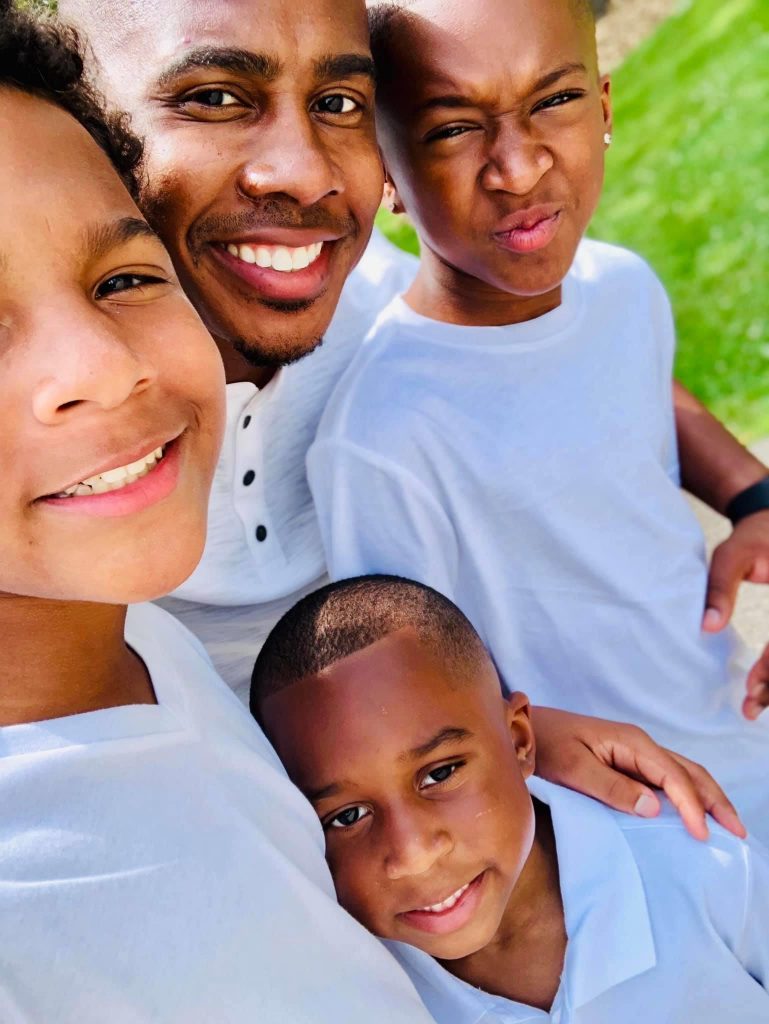
Does the American public at large take George Floyd’s death seriously, and see it for what it is? Alexis says that some people do, and some people don’t. But she is encouraged by the mindset of many of the nation’s young people.
“The ones who do, they hurt just like we hurt,” says Alexis. “They’re demanding to be heard and demanding change just like we are. You can see that in the younger generation especially, which is amazing.”
Alexis says she and her husband have been honored to participate in peaceful protests, and they are grateful to open up a dialogue. Her husband spoke to a crowd and was thanked for giving his perspective on being a Black American.
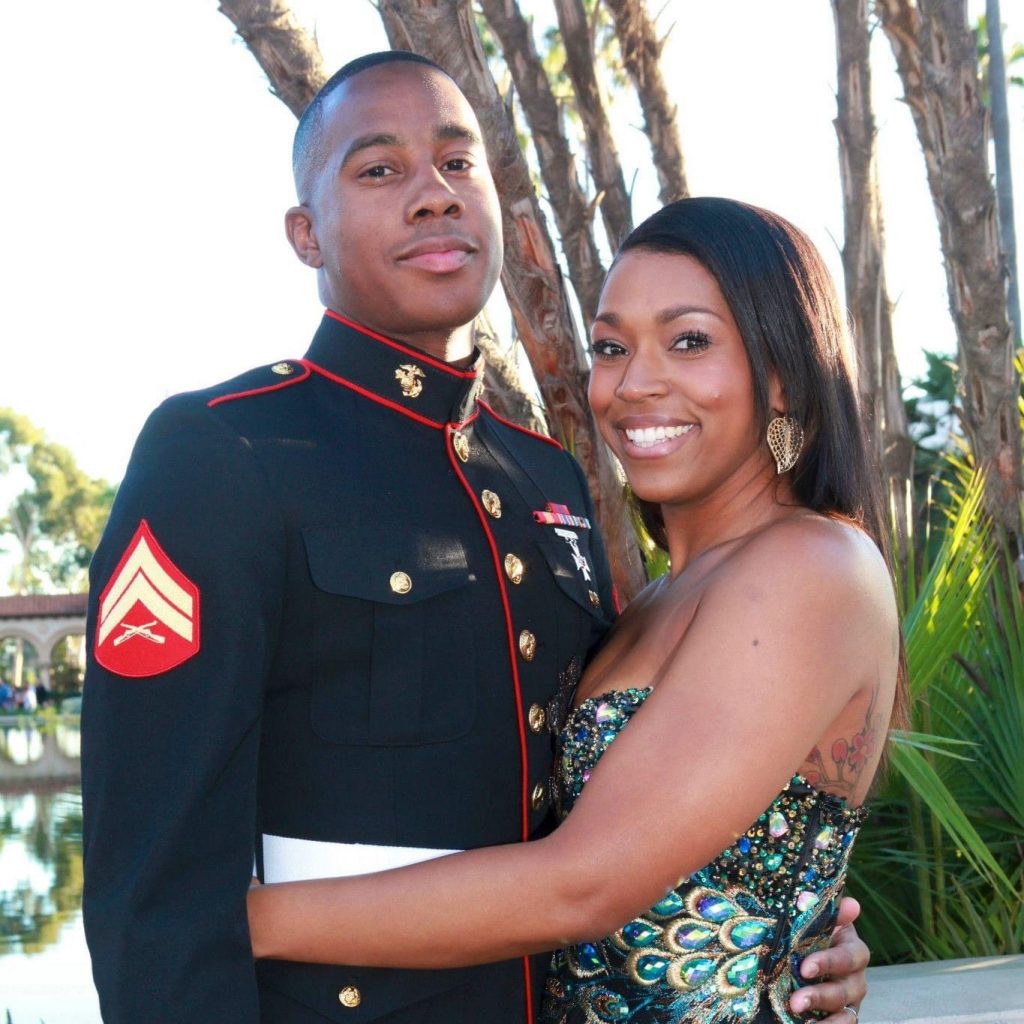
“We were amongst a crowd of people who were ready to listen with their ears and hearts, a group of people who was ready and willing to come along with us and put in the work and love that’s needed to clean up a mess that’s gone on too long,” says Alexis.
She says that although she does not agree with riots or looting, allowing the actions of a few selfish opportunists to distract us from the main issue is “unacceptable.”
“I’m expected to not hold a few ‘bad apples’ over an entire department or organization, so I would hope the same goes for the general public,” says Alexis. “It’s time to treat everyone like human beings. Black, brown, yellow, everyone.”
To put it lightly, racial tensions are at an all-time high. But many white people, including many who live in Coronado, say they want to be better allies. What advice does Alexis have for those, who truly seek change and want to build a better world? She says we have to acknowledge that racism does still exist. It comes in many different forms, and it’s everywhere. And Alexis acknowledges that it can’t be fixed overnight.
“We’re only asking for people to listen. Not just with your ears, but with your heart. Listen to learn the realities of others. Not listen with the intent to justify or prove us ‘wrong.’ We’re not asking for reparations, we’re not asking for revenge. All we’ve asked was to have you all come along beside us as a fight for change…together.”
Alexis says the “we’re all in this together” mentality for COVID needs to carry over to this other virus: the virus of racism.
“Racism is just that, a virus that attacks your heart and ability to be empathetic to others,” says Alexis.
She hopes that going forward, police brutality will be viewed as a non-negotiable, and that there will be zero tolerance for it.
“Not all officers are bad, we all know that,” says Alexis. “Just like we should all know by now that not all people of color are a threat; but after seeing countless videos of the ‘bad’ ones committing heinous acts, while no other officer steps in to help…Where are the good cops during those times? Where are the ‘Helpers’ as Mr. Rogers Would say?”
She says although ending racism would be the ultimate goal, Rome was not build in a day….or even a week. There are centuries of damage that will take quite some time to fix.
“But it’s possible if you really want it,” says Alexis. “All everyone wants is to feel safe and accepted. We’re just asking you to listen.”




